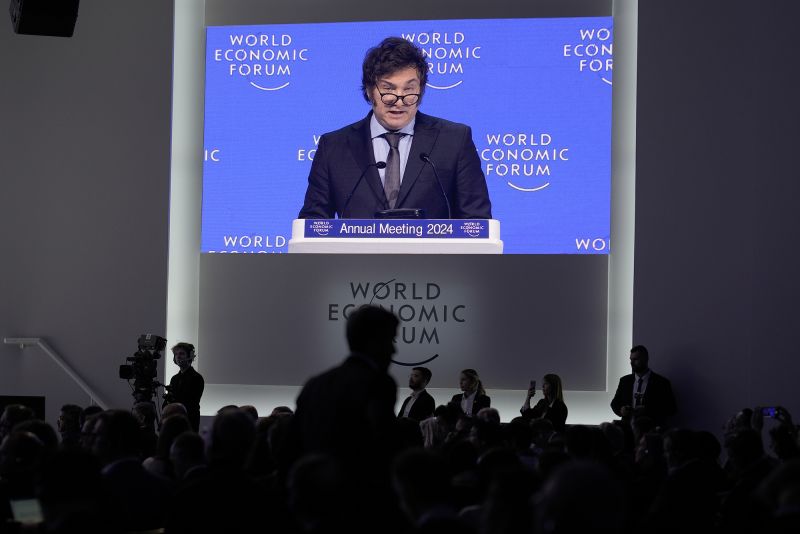
Argentina's Nationwide General Strike: Unrest and Opposition

A detailed look at the nationwide general strike in Argentina and the opposition to President Javier Milei's austerity measures and reforms.
The Call for Action
On Wednesday, Argentina's labor unions initiated a nationwide general strike in response to the austerity measures and reforms proposed by the country's libertarian President, Javier Milei. The strike, which commenced at 10 a.m. ET, is expected to last 12 hours, and has drawn thousands of participants marching toward Congress in the capital of Buenos Aires. The fervent opposition to President Milei's policies has sparked widespread discontent and unrest across the nation.
President of Argentina Javier Milei delivering his speech at the World Economic Forum in Davos, Switzerland on January 17, 2024.
Since taking office, President Milei has unveiled a series of public spending cuts and has urged lawmakers to endorse a comprehensive program of deregulation aimed at revoking protections for businesses and consumers, while facilitating the privatization of public companies. The General Confederation of Labor (CGT) and a coalition of social movements orchestrated the strike in defiance of a decree signed by Milei to deregulate the economy, as well as an omnibus bill presented to lawmakers. The CGT has successfully contested part of the decree, leading to a temporary suspension by an appeals court. This clash between the government and labor unions has intensified the ongoing standoff, amplifying the urgency of the situation.
Impact and Disruptions
The repercussions of the nationwide strike have reverberated throughout Argentina, causing significant disruptions in various sectors. Notably, the transportation sector has been severely affected, with flag carrier Aerolíneas Argentinas announcing the cancellation of all operations on Wednesday. The airline reported the cancellation of 295 flights, affecting more than 20,000 passengers and incurring a substantial financial cost. This widespread disruption underscores the far-reaching consequences of the strike, prompting concerns about the economic fallout and the enduring impact on the populace.
Moreover, the Ministry of Security has enforced the country's 'protocol for maintaining public order in the event of road closures,' commonly known as the anti-picketing protocol, to manage the protests. Despite the implementation of this protocol, protesters have asserted their constitutional right to demonstrate, emphasizing the fundamental nature of their cause. This clash of rights has engendered a complex societal debate, reflecting the deep-seated divisions and conflicting perspectives that have emerged in response to the strike.
The Milei Presidency and Economic Agenda
The ascent of President Javier Milei, a political maverick and self-proclaimed 'anarcho-capitalist,' in Argentina's presidential election marked a departure from conventional political paradigms. His unorthodox campaign, characterized by bold promises to revamp the country's embattled economy, resonated with a populace disillusioned by persistent economic challenges. Notably, Milei's emphasis on curbing hyperinflation, which reached a staggering 211% in December, encapsulates his overarching commitment to addressing Argentina's economic woes.
Milei's pursuit of deregulation, public spending cuts, and privatization has galvanized both fervent support and vehement opposition. The symbolic gesture of brandishing a chainsaw at campaign rallies epitomized his audacious vision for drastic reform, underscoring the unyielding determination to effect sweeping changes. However, the acrimonious response from labor unions and social movements reflects the deep-seated resistance to his policies, signaling a protracted struggle for consensus and reconciliation.







